
The idea of selling products online had a rather slow start initially. But over the years, it has become almost mandatory for any business to have a digital outlet. Numerous studies have shown that the new generation of customers are much more comfortable with ordering things online.
And, although the idea of creating an online store can seem daunting at first, in reality, it has gotten a lot easier over the years. This is thanks to website building platforms that specialize in providing simple tools for creating an eCommerce website for your business.
You might be thinking to yourself, “Why not just go to an agency and have them create my first online store?”. And the simple answer to this question is: agencies cost a lot of money.
To elaborate, let’s take a look at some of the advantages that eCommerce website builders have when it comes to building an online store yourself.
- Simple to use. All of the eCommerce platforms outlined in this article have a notoriously high reputation for being simple to use. This means you don’t need prior technical knowledge of customizing design or adding new features to your online store.
- Cost-effectiveness. An agency will quote you anywhere from $5,000 to $25,000 for custom projects. And that is without maintenance or additional revisions in the future. In comparison, the average eCommerce website builder will cost you around $30 per month.
- Instant results. Want to apply a custom design change or implement a new application? In most cases, this can be achieved instantly since independent features are provided by the platform itself. As such, you won’t need to take your shopping website offline.
- All-inclusive. Website builders solve problems like domain names, hosting management, technical issues, and payment processing without any additional costs. This ensures a smooth experience both for you as a business, but also your customers.
It goes without saying, these advantages and benefits barely touch the surface of what website building platforms are all about. So, to understand more, let’s take a closer look at the best eCommerce website builders.
10 Best Online eCommerce Website Builders
The idea that something is better is largely a subjective matter. As such, our definition for best can be understood as a platform that is both reputable, and widely utilized by other business owners.
Each of the online store builders in this article have their key features that make them stand out. As such, we’ll be focusing on highlighting those features so that you’re able to discern which of these eCommerce platforms are most suitable for your business needs.
Ready to get started? Let’s do it!
Shopify [ create online store ]

Shopify is home to more than 2 million online stores. As far as eCommerce platforms go, Shopify has set the bar extremely high. And this is good, because Shopify is able to resolve a great deal of your digital selling needs – without the need for you to get into the technicalities.
Shopify takes care of branding, online presence, and getting your store set up. As a customer, you will be able to choose from more than 100 unique store designs, letting you create the perfect shopping experience for your customers.
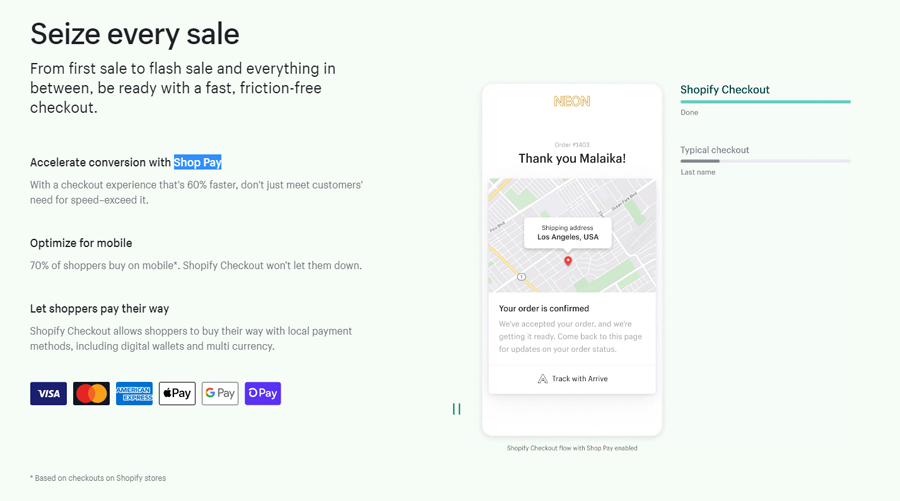
Your payments can be processed directly within the Shopify’s interface using Shop Pay. The checkout experience is seamless and helps save customers time, whether it’s their first or fifth purchase with you.
Last but not least, Shopify covers things like website hosting, domain name registration, search engine optimization, and much more. This ensures that you’re not juggling between multiple services to upkeep your store.
Pros
- World-class brand recognition. Brands such as Heinz, Gymshark, Staples, and many others are their clients.
- Integrated email marketing tools to help you stay in touch with your customers at any time.
- Use Shopify Shipping to send out your packages from an allocated fulfillment location. Available in the USA, CAD, and AUS.
- Enormous variety of Help resources, including documentation, community forums, and in-depth blog posts.
- User-friendly interface so you never feel like you’re lost. From the sign-up page to publish your online store, everything is documented to help you get there as quickly as possible.
Cons
- Affordable, but not free. A trial account can be made, which will have to be upgraded in due time.
- Features are largely dependent on Apps.
- No native multilingual support. Can be achieved with some themes or through the apps store.
- Individual fees on all payments you process, from 0.5% to 2%.
Wix [ create online store ]

Wix was one of the first platforms ever to step their foot in the website building business. Famous for being simple to use and budget-friendly plans, Wix has an outstanding track-record of helping people create websites, blogs, and eCommerce stores.
One of the elements that Wix stands out with the most is versatility. With Wix, you can create as simple or as complex of a website you desire. For example, if you plan on selling digital goods such as online courses, you can implement a custom bookings system straight from your Wix dashboard.
Likewise, you can maintain your entire eCommerce operations online thanks to the many tools that Wix for eCommerce delivers. Tools such as carrier deliveries, multi-channel selling, dropshipping products, and dynamic eCommerce store designs.
Pros
- Choose from hundreds of pre-built website templates or have one of the Wix experts help you find the perfect design.
- Optimized website structure so it meets the necessary requirements for the latest search engine optimization standards.
- Extremely potent visual website builder – giving you full control over how your online store looks and feels.
- Use the Wix ADI (Artificial Design Intelligence) system to launch a personalized online store based on your specified input.
- Hundreds of Apps that you can find in the Wix Store. These Apps help you better maintain the flexibility you require for your business operations.
Cons
- Entry-level plans are quite limited in their features and provide nominal amounts of bandwidth. Upgrading your plan is essential.
- Templates are independent, which means that if you wish to change your site design – all your products will have to be added anew.
- Although Wix provides you with the tools to import an existing eCommerce store, it doesn’t provide the tools to export it.
Squarespace [ create online store ]

Squarespace is well-known for its elegant approach to website design. And it comes as no surprise that many designers, fashion artists, creatives, and business people have chosen Squarespace as their website building platform.
Squarespace is an all-in-one platform – so everything from building your first online store to marketing it can be done without needing to rely on external services or products. Email marketing, paid ads, promotional content for your store – you’re able to access all these features from the same dashboard that you use to create and manage your website with.
An interesting feature that Squarespace provides is its mobile editor. This means that you can edit your store, publish blog posts, or add new products by using your smartphone or tablet device. Any changes you make will be automatically saved for future revisions or otherwise.
Pros
- Fantastic selection of templates, designed to look great on desktop and mobile devices alike.
- Great options for adding custom images, provided by world’s leading stock photography websites.
- Import data from an existing online store that you might have created on another platform.
- Email marketing from within the Squarespace dashboard.
- Full-on support for Zapier, letting you amplify your store with dynamic actions.
Cons
- Content you create becomes fairly locked-in, meaning it’s near impossible to export your data to other platforms.
- Currency limited to U.S. Dollars by default.
- Email marketing is provided by MailChimp, to use another service you’re going to need to implement Zapier.
- Affordable, though additional features require independent investment.
BigCommerce [ create online store ]

BigCommerce is strictly focused on providing an eCommerce-only experience. This means that from the get go, all the features and tools are targeted at helping you create the ultimate online store for your business.
If you’re looking for a platform that does it all, look no further than BigCommerce. Their service is built around the idea of helping you both create and maintain your digital store, but also give you the necessary tools to expand it as the demand for your products grows.
BigCommerce will let you connect your newly created store with eCommerce giants like Amazon and eBay. This means that your entire product catalog can be published on those platforms, which should help attract even more customers to your products.
Pros
- Integrate with Google Pay, Amazon Pay, and Apple Pay.
- Generate gift cards, coupon codes, and special offers.
- Customizable widgets for displaying product ratings and reviews.
- Cart persistence by auto-saving customer orders that can later be accessed from a mobile device or vice-versa.
- No transaction fees if you use any of the leading payment gateways.
Cons
- While template selection is ample, creating a truly unique design might require an investment into a premium style.
- A mandatory plan upgrade if you exceed the set annual rate for sales.
- Features like price lists and custom facets are limited to Pro and Enterprise plans only.
Weebly [ create online store ]

Weebly is amongst the leading website builders on the market, though it’s functionality extends to building online stores, too. The company was acquired by Square – a popular payment management platform. As a result, Weebly is able to provide both the required tools for visual website building, but also help your business process payments effortlessly.
After you’ve signed up and completed publishing your website, you’ll gain access to insightful analytics. These analytics cover a wide variety of interactions that customers perform in your store. As such, you’ll have a reference point whenever you plan on adding new products or expanding the design of your online shop.
Pros
- A very easy to use visual website building interface. Click an element you wish to edit, and select from the provided choices.
- Free to get started with! Premium plans start at a modest price of $5 per month.
- Templates designed for use on all types of devices.
- Create sections on your website that can only be accessed by registered customers.
Cons
- Not the best choice when it comes to eCommerce stores who wish to expand in the future. Weebly emphasizes small business operations more than anything.
- Although the visual editor is extremely easy to use, it can feel limiting when you’re trying to make drastic changes to your design.
Volusion [ create online store ]
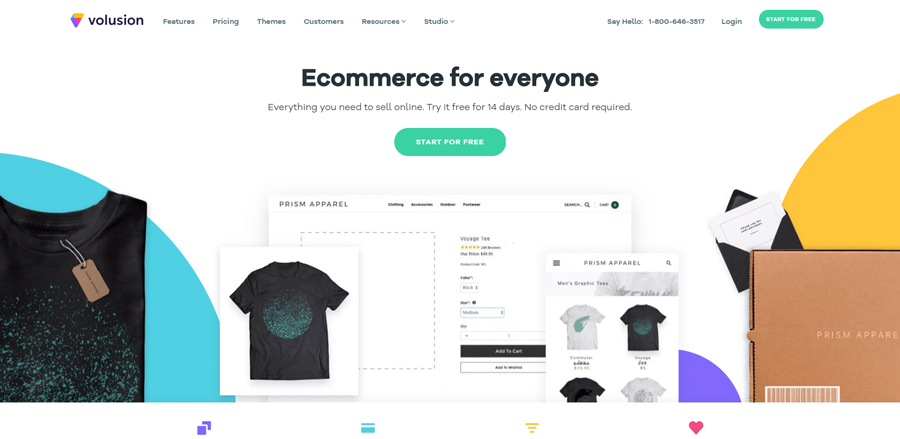
Volusion is a world-class eCommerce platform that has customers across industries such as Home, Garden, Food, Auto, Health, Beauty, and more!
The company runs its entire business model within a cloud-based infrastructure, which means that you get a managed maintenance experience for your business. From simple features like responsive themes, and a rich content editor, to more complex tools such as vendor codes, store management, variant pricing, and dropshipping!
It is the ideal platform to consider for any entry-level to medium-sized eCommerce business. As an eCommerce-first service, Volusion is all about helping you make more sales while ensuring that customers are happy and satisfied with your services.
Pros
- Global currency! Let customers select the currency in which they wish to purchase a product.
- Detailed customer reviews which you can highlight anywhere on your store’s website.
- Recurring payment options, a great feature if you’re in the business of selling services or digital products.
- Great variety of payment processing options, including Stripe and PayPal and others.
Cons
- One of the more complex platforms in this list, with many great features and customization options. Ideal choice for business owners who are looking for a platform to commit to in the long-term.
- Less-than-great options for publishing content outside of blog posts.
- In comparison to other platforms, Volusion falls a little short on the amount of apps and external tools it provides.
3DCart [ create online store ]
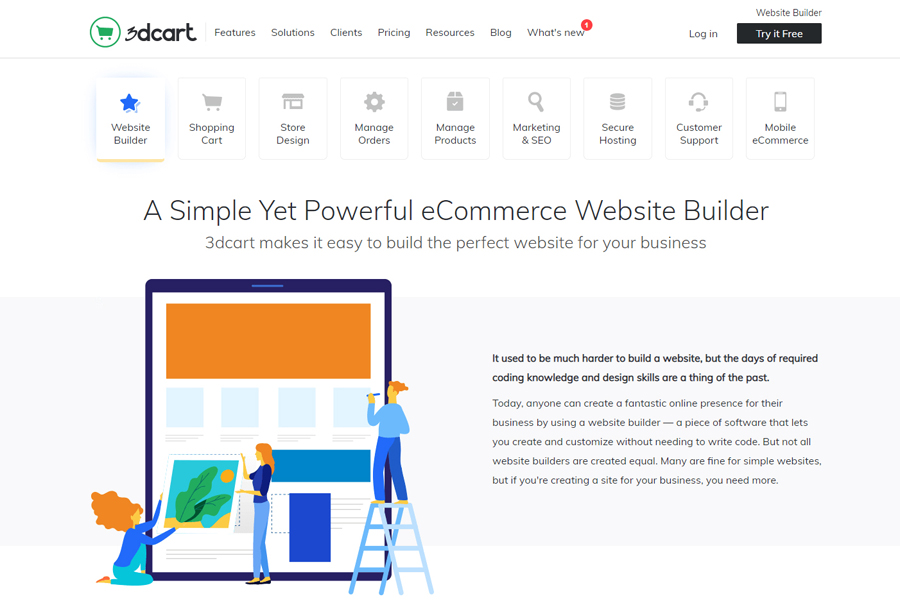
3DCart is a company that has been around since the late 90s. And with such a long track record, their expertise in the field of digital commerce is unmatched. Which makes their platform an ideal choice if you’re looking to have your online store managed by a mature brand.
On top of providing a website building experience, 3DCart further simplifies that process by letting you choose the industry within which you plan to sell. For example, if you’re offering digital products like eBooks – 3DCart will recommend the best website design to choose from.
Another thing that 3DCart does extremely well is SEO. Their commitment to helping you optimize your content for search engines is unmatched.
Pros
- Design choices for simple single-product stores, but also professional and sleek designs to choose from for an established enterprise.
- Detailed product pages which you can optimize through various product variants and other custom specifications.
- Secure web hosting experience with a guaranteed 99.9% uptime!
- A dedicated support team ready to assist any questions or issues that you may encounter.
Cons
- A reasonable learning curve which might put off smaller business owners.
- Advanced features are locked behind higher-tier paid plans.
- Not the most complete selection for Apps outside of the features already provided by the platform itself.
Webnode [ create online store ]

Webnode is home to tens of millions of customers, and recently they have expanded their operations through guides and articles to help customers achieve even more from their websites and online stores.
In their own words, setting up your eCommerce store with Webnode can be done in 4 simple steps:
- Sign up – it only takes a moment.
- Choose the design you like.
- Add images, texts and other content.
- Publish your website with just one click.
This makes their platform an ideal choice for starters and intermediate users alike.
Pros
- Custom emails (up to 100 accounts) based on your domain name.
- Detailed store analytics to understand how well your products are doing.
- Custom memberships with permissions and user levels.
- Design separates pages for your homepage, blog, and the actual store.
- Simple approach means better loading times, and in turn, better search engine rankings.
Cons
- Rather simple, so not the most ideal choice for growing businesses.
- Online reviews emphasize the lack of consistent customer support.
Site123 [ create online store ]
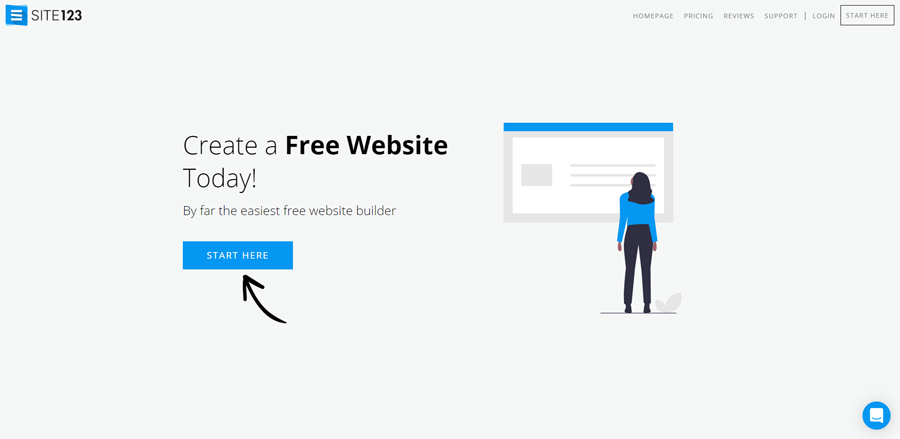
Site123 has seen rapid growth in recent years thanks to their highly acclaimed website building interface. Using modern technologies, Site123 is able to provide an intuitive website building experience that focuses on personalization and your individual needs.
Best of all, their eCommerce features include necessities such as shipping and taxes, digital product management, store inventory, custom product variants, brand identification, and much more!
Pros
- Straightforward process from setting up your website to adding your first product.
- Numerous payment systems that you can implement to process payments from your customers.
- Free to get started without a domain name, while a premium plant starts at a modest $8 per month.
Cons
- In the event that you dislike a particular design (one you have committed to), you have to start over from a different one.
- Rather than having integrated features, a lot of the functionality is passed down by Apps and Plugins.
- It’s impossible to export your site data to use it on another service.
Strikingly [ create online store ]

Strikingly is a featured-based eCommerce website building platform. It is intended to be used by small business owners with no prior website building experience.
As such, you can expect easy to navigate tools and helpful documentation files to help you start your online store as quickly as possible.
If you need a simple but effective way to build a product page or a small online store, then look no further than the features that Strikingly has in store.
Pros
- An absolute breeze to use. Select a template, add custom elements and you’re done!
- Fully optimized for mobile devices.
- Analytics which collect various types of data.
- Blog solution to help you publish news and special announcements.
- Security is a priority.
Cons
- Older templates can feel a little bland.
- Lacks in features to scale your business further.
- All designs are limited to a one-page concept. (Except for blog posts!)
5 Best eCommerce CMS Platforms
Unlike eCommerce website builders, an eCommerce CMS ( Content Management System) is something you have to manage personally. This means that in order to use an eCommerce CMS, you will need to have:
- A separate hosting account.
- A custom domain name registered using a registrar service.
- Experience in modifying website design without a builder.
- Either personal technical expertise or a dedicated person on your team who understands how servers and websites work.
A lot of these necessities can actually be learned rather quickly. Especially when it comes to managing a hosting account or registering a domain name. Similarly, website design management is possible through third-party themes, of which there are ample amounts for the specific eCommerce CMS platforms we have listed below.
Ideally, you should have a solid business strategy to get the most benefit of using an eCommerce CMS. Unlike website builders which can be simplistic, a CMS lets you scale your business infinitely by comparison.
Adobe Commerce (previously Magento)

Adobe Commerce by Adobe is one of the leading open-source eCommerce systems to be used by brands looking to build a community around their product(s).
Apart from the standalone version, Adobe Commerceis also available through the Adobe Commerce platform. This solution removes the need for you to host Adobe Commerce independently as Adobe itself will provide the infrastructure.
Adobe Commerce is great for small business owners, but also growing enterprises looking to scale hundreds of thousands of products.
PrestaShop

PrestaShop offers a free (open-source) eCommerce solution for businesses looking to scale their operations.
More than 300,000 eCommerce businesses all across the globe are using PrestaShop to power their digital commerce needs.
Their list of features covers everything from store customization to marketing, customer support, legalities, company management, and more!
WooCommerce (WordPress)

WooCommerce is a WordPress-based eCommerce solution, an absolute favorite amongst small to medium-sized businesses.
It runs at the back of your WordPress installation, which means you will have access to all the free goodies like themes and plugins that WordPress provides.
WooCommerce itself also has an extensive accessories infrastructure – letting you do as little or as much with your online store as you desire or require in the moment.
OpenCart
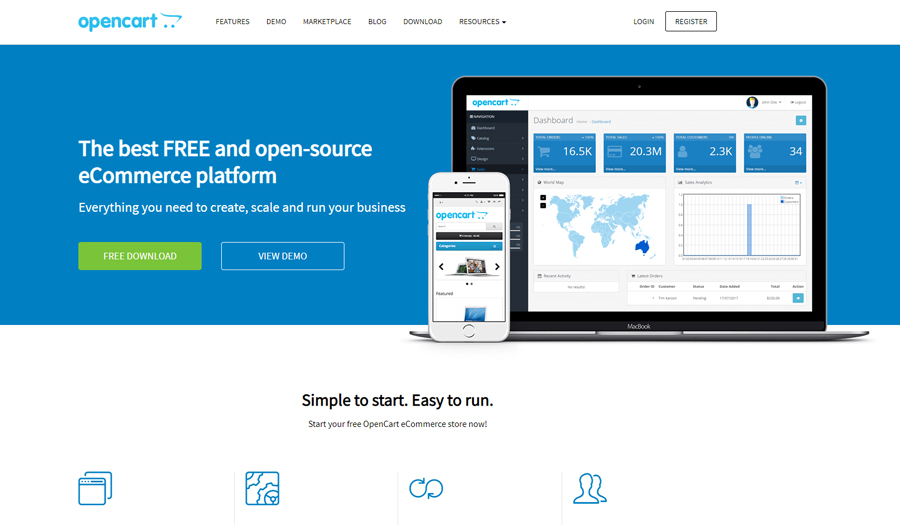
OpenCart is a Joomla-based open-source eCommerce platform which lets you turn your Joomla! website into a full-fledged online store.
One of the features that people love the most about OpenCart is its multi-store integration. This feature lets you set up multiple shops within the same business structure.
Furthermore, each store can have a dedicated design and features, though all the stores can be modified individually from your OpenCart administrators dashboard.
How to Choose an eCommerce Platform?
It can get overwhelming to try and understand each individual feature of a specific eCommerce platform. And, it is not uncommon for business owners to make bad judgement on a specific platform.
So, to make the process simpler – let’s take a closer look at how to choose the right eCommerce platform for your business.
#1: What are Online eCommerce Platforms?
At its core, an online eCommerce platform acts as the bridge between your products and the customer who wishes to buy them. Modern eCommerce platforms provide a unified structure of your entire digital business operation. This includes the management of customer data, your product stock, invoices, availability, communication, and so forth.
Here are the principles upon which most eCommerce platforms are built upon:
- All in one. Removes the need to use external systems or software to run your business. As such, you’re able to manage accounting tasks, orders, marketing, customer support, and more, within the platform itself.
- Know your customer. An eCommerce platform will provide the necessary tools to track every single interaction that a customer has had within your online store. This will make it easier to personalize offers, marketing emails, and support queries.
- Automation. Running on low supply for a specific product? Wish to send a welcome email? Created a new seasonal offer? All of these tasks can be automated by using an eCommerce platform.
- Customer experience. Create dynamic and interactive customer experiences that can be interacted with both from mobile and desktop devices.
Any task that you’d be doing within a physical store context can also be accomplished within an eCommerce platform. And, in most cases, in a far more efficient manner than the former.
#2: Important Factors when Choosing an eCommerce Platform
Not all eCommerce platforms have the same exact features. Specifically, things like pricing, payment processing fees, third-party integrations, security, and other features often differ.
As such, you should understand the most important factors when it comes to choosing the best eCommerce platform for your business.
Let’s take a closer look.
Pricing & Fees
It doesn’t matter if your business is small or you’re an experienced seller, knowing the pricing of a platform you choose is pivotal. Most eCommerce platforms provide layered plans, which can be upscaled or downscaled based on your specific requirements.
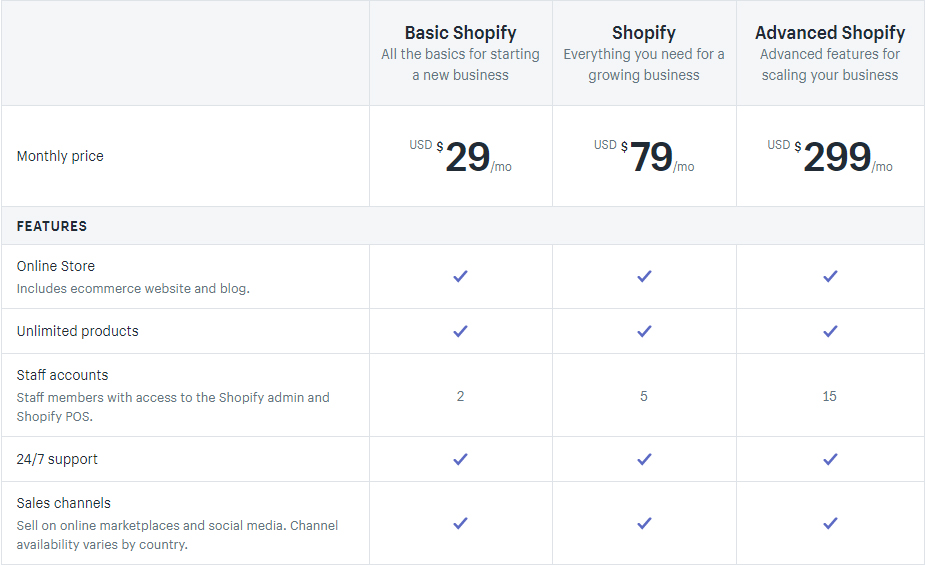
Platforms like Shopify provide multiple pricing options, and the pricing page itself outlines what kind of benefits you’re going to get by choosing each individual plan.
Also, what kind of payments are you going to be accepting? Only credit cards, or also through payment gateways such as PayPal?

Some platforms provide an integrated payments system, and will add a nominal fee based on the type of a plan you’re using. Additionally, you can use external services and reduce those fees to the bare minimum.
Third-party Integrations
One of the trends amongst the best eCommerce platforms is the use of third-party integrations. For example, if you have a mailing list with MailChimp – it makes sense you would want to connect that list with your online store directly.

Thankfully, the eCommerce platforms outlined in this article, for the most part, support such integrations. A lot of such tools and apps actually help to improve your online selling productivity. So, it’s definitely worth checking them out and seeing what fits your business strategy.
Search Engine Optimization
Optimizing your online store for search engines should be high on the priority list. Search giants like Google are major forces of driving organic sales, and with SEO optimization helps to rank your content and product pages higher up on the ladder.
Here are the things to look out for:
- An ability to write blog posts and publish articles.
- Integrated reviews system that customers can use to leave their feedback.
- Simple to navigate store structure; menu links, product pages, etc,.
Mobile-Ready Design
Latest studies show that more than 65% of online searches are performed on a mobile device. And, in most cases, customers will finalize their purchase from that same device. As such, it’s extremely important that your shopping website is mobile-friendly.
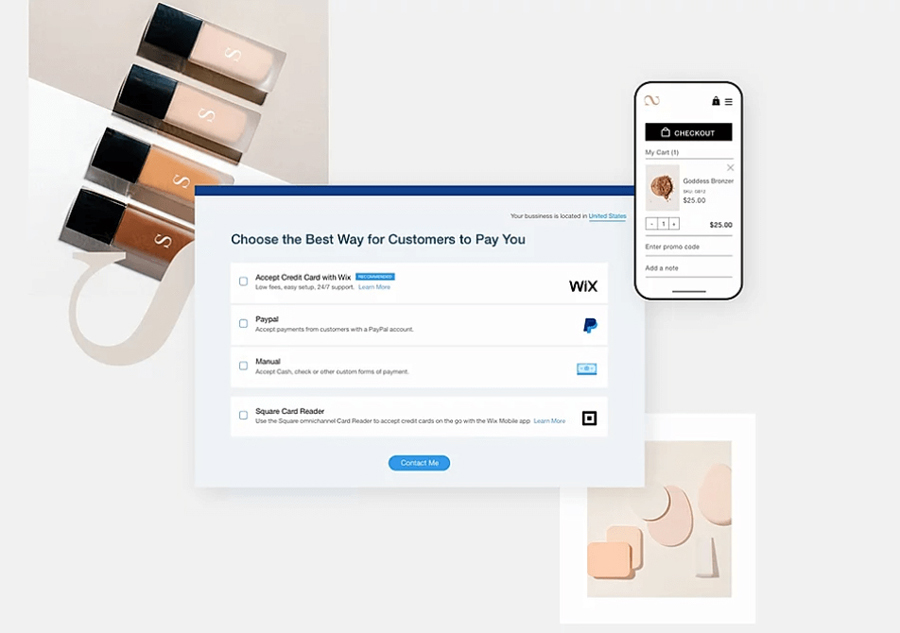
So, if you’re adding new features to your eCommerce site – it’s always a good idea to double-check that it works with mobile devices.
#3: A Look Inside eCommerce Website Builders
Are you still unsure of how eCommerce website builders work? If so, let’s dig a little deeper to understand how they work, and what it looks like to create an online store using a website builder.
So, how do they work?
In as little words as possible, a website builder enables you to create a website, in this case a shopping website, without needing to write any code. All actions are predetermined whilst giving you plenty of flexibility in designing your website.
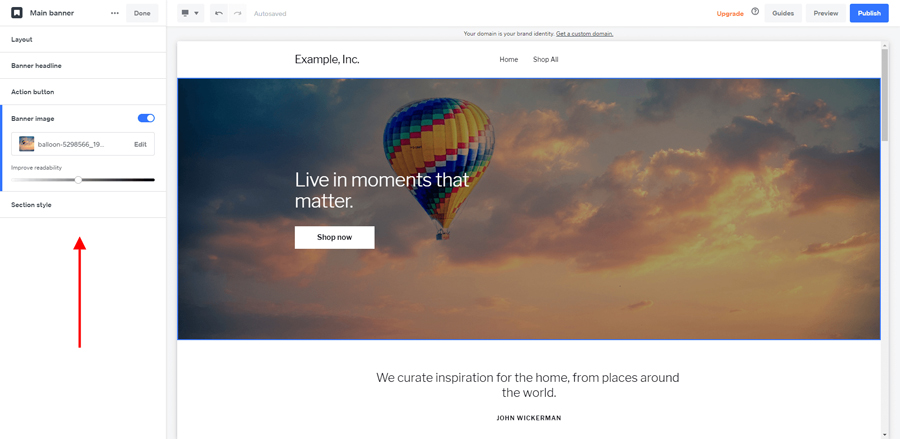
This example is taken from the Weebly online shopping website builder. After you finish signing-up (which takes less than a minute) you can go ahead and generate a new website and then publish it. Afterward, you’ll be granted access to the actual website building interface.
In this interface you will find tools that let you modify (add, remove, edit, etc,.) any element on your store’s homepage. Here is another example:
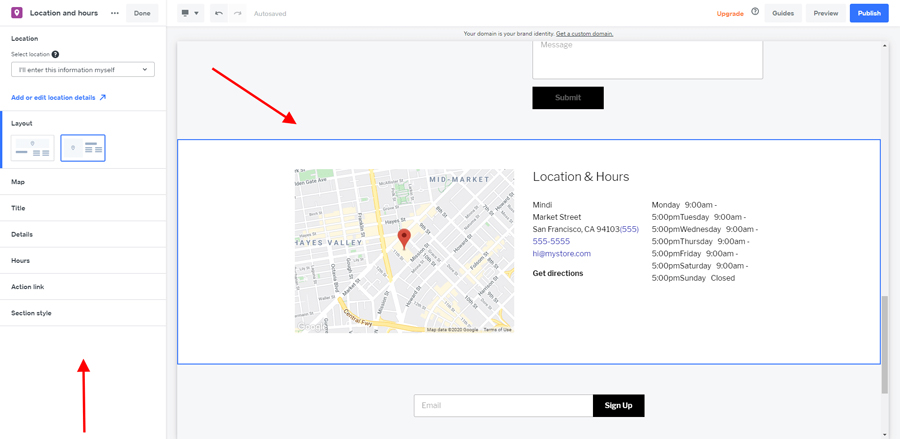
In this example, you can click on the Location widget (which can also be hidden if you want), and you’ll see numerous options appear on the right-hand sidebar.
These options allow you to:
- Change the appearance layout.
- Edit the title.
- Specify the address of your business location.
- Add an actionable link.
- Change background color or add a background image.
And such options are available all throughout this website building interface. While for this example we used Weebly – all eCommerce website builders follow these same rules.
The only difference is in the list of features and options that each builder provides, which we discussed earlier in the article.
Best of all, when working with website builders – you have the option to Preview any changes that you make to your online store. As such, you won’t disturb the shopping experience for customers who are already making purchases from your store.
#4: What Additional Features do the Best eCommerce Builders Have?
If it’s your first time building an online store, it helps to understand the different useful features that eCommerce sites use.
Here’s a summary of the features you ought to look out for to help you streamline your entire online selling experience.
- Integrated CRM. Managing customer relations is essential to your success. If a specific eCommerce builder doesn’t provide CRM, it’s very likely that you will have the option to integrate a well-known system using third-party integrations.
- Payments Options. Can customers pay with PayPal, Credit Cards, Cryptocurrency, Cheque, or other payment methods? These are the questions you should ask yourself before deciding on the platform you would like to use for your online store.
- Offers and Discounts. How will you manage seasonal sales or other special offers? Being able to provide coupon codes on-the-go can be useful to retain sales consistency, but also to rescue sales that haven’t completed the checkout process.
- Tracking and Delivery. Are customers able to track their shipment details directly from your store? If a specific eCommerce builder doesn’t provide this feature, you can likely get an alternative directly from the brand that provides your delivery services.
- Security. A clean track-record reaffirms brand trust and reassures customers that it’s safe to shop with you. Different eCommerce platforms provide unique security features, such as backups, password protection, encryption, SSL, and more.
Your goal should be to have a completely unified online store experience for you as the business owner, and for your customers as the consumers.
So, How to Choose the Best eCommerce Website Builder?
There are countless options for choosing the right eCommerce website builder for your business.
Whether you’re looking to create a small-scale store for selling crafts, or wish to transition an ongoing business to the digital world – the different platforms outlined in this article should set you well on your way.
Remember, you always have the choice to try out a specific platform that caught your eye. Most platforms do have a free trial option, between 14 and 30 days, and this should give you plenty of opportunity to see if it’s the right fit for you.





30 comments
Wonderful post! We are linking to this on our website. Keep writing great content.
I’ve stopped my choice on Shopify and do not regret about this. From all website builders in this list – Shopify is really professional ecommerce website builder. You can build simple online store on any website builder but if you need big and really functional ecommerce store – it’s better to make it on Shopify. As a businessman with experience – I don’t have doubts in this.
Nice Article. As for me, I personally prefer Shopify – really functional platforms.
These are all good platform to build e-commerce but you can also go for Magento for more customization
Have I missed something, as I only count 9? FYI, one thing I’ve been finding hard to determine from reviews is data entry and updating options. I’ve over 400 SKUs, and whilst I might enter them into a datasheet once, I know from experience that manually updating more than one data document is a recipe for delays, error and price/description mismatches (until automating everything round a single spreadsheet, I sometimes ended up with three different prices; one on the (manually updated) shop labels, one on the (manually updated) price list; and the ‘master’ one on the invoicing spreadsheet. Somehow, the data for stuff on the website has to interface (reasonably automatically or cut ad pastably) with the data for the physical shop, but this is not easy to see on reviews (or it’s so simple that no-one thinks to mention it).
Great comparison.
Thanks for highlighting the top features individual eCommerce platforms are having. Comparisons like this helps people to decide which online platform is best for them start their online venture. I think mentioning the open source platform “WordPress” would be worth your time.
Good selection. I personally prefer Wix and Shopify – really functional platforms.
This is all new and mostly over my head. I already have registered URLs, websites and host provider is this a prerequisite for these sites? Question is: Will I need this after I go to one of your previously mentioned site?
Outstandingly written article on eCommerce storefront alternates! Due to the volume and budget, i go for Shopify. It’s easy to implement and you can start your own storefront within hours!
Ecwid is great also
Hello
What web building platform would you suggest is best for webinars and clicking through to the payment processor Stripe? The webinars provide a service so No products would actually be shipped. Any help is greatly appreciated. Thank you for your time and input, it’s appreciated.
I want to open an online clothing store for children, I been reading about web builders and other. Do I need a web builder, or can I just build my own and then get a host company for my store. This is very confusing. Thanks for your time!
Hi Mary (and anyone else reading!) I just wanted to say I’ve made a little online quiz to help you decide which eCommerce platform is best for you – depending on your business, technical ability and so on. It might make the decision a little easier and more customised to your needs!
Where do we get to that ? I could do with it?
When building an interactive selling site with OOAK items, which site do you think would work the best? Some have item limitations. and some have site space limitations, not allowing for multiple photo views, which would you suggest to do that kind of a selling business?
Your best ecommerce website builders came in handy for me right now. I just decided to develop my own online store selling clothes and accessories. I’ve read many reviews including this one but I don’t have exact answer – which ecommerce platform is the best for me? Are there any special ecommerce builders exactly for clothes stores or this is just my fantasy? And one more thing – if I will use my domain name – are free ecommerce web builders suitable for me?
Hey outstanding blog! Does running a blog like this require
a great deal of work? I have absolutely no expertise in programming however I was hoping to start my own blog soon.
Anyway, should you have any suggestions or tips for new blog owners please
share. I understand this is off subject nevertheless I simply wanted to ask.
Appreciate it!
Your comment is not related to the discussion of this post. This post is not about blogs and how to manage blogs by novice bloggers but about ecommerce website builders and other platforms for developing online store. If you have any questions regarding this matter – feel free to ask.
So what is the best website builder for online store that mostly recomended?
There is no unequivocal answer on this question. From all mass of ecommerce builders you can pick out 3-5 of the most advanced but you cannot say what exactly ecommerce web platform is the best one. Each website builders has its own pros and cons – even the best ones. My advice – to choose a few ones, all ecommerce website builders have free trial versions. And don’t need to spare your time on this – thanks to this you can choose the most convenient ecommerce website builder for your online store and in future will avoid many possible problems.
Great list. thanks a lot!
I’m using magento for my online store. At the moment it’s the most functional platform for creating online shope. I’ve discovered only one significant cons of Magento – it’s the high cost of developing a web site. Services of designer and programmer cost me a lot or I had to be satisfied with some free magento theme, but it would be not unique design of my online store. The rest – this ecommerce builder is exactly what you need.
Magento isn’t ecommerce website builder… It’s CMS – content management system with open code that’s why it’s not correct to compare Magento with online website builders.
I don’t see a principle difference. It might be because I’m not a specialist in web development. It’s quite enough for me that magento allows to create great online stores.
But you don’t name a airplane a car only because it has a wheels and before flight it uses it for moving?
Magento and other eCommerce CMS like Prestashop, Oscommerce, Zencart – are software in simple terms. You download its distributive on official website, then integrate it into layout of your website, then customize database and as a result you have a website. But it’s not the end. Because you need to buy a domain name and hosting for it. After this you have to upload ready website to a hosting and only after this you will be able to use your website. For web developer – it’s an ordinary task though it sounds complicated.
WYSIWYG (What-You-See-Is-What-You-Get) website builders have absolutely different principle of work. You choose template design you like most and edit it as you need by dragging blocks and design elements with mouse. For this website builders have drag and drop editors. Them you select domain name and push the button Publish and voila – constructed by you website is ready and online. I.e. you don’t need to additionally buy anything – you do everything online and usually very quick.
Dude. Magento and other eCommerce CMS like Prestashop, Oscommerce, Zencart – are software Free. You no need buy addons or plugin with high cost like this list blog. because there are million freelancer and developer gave you free modules or addons and service if you pay them to build what you need.
Im use prestashop and very happy. in list Website Builders have no setup Shipping for my country and other addons if you needs then you must face to face with high cost or you waiting with nothing.
Are you web developer? Are you engaged in development of ecommerce stores?
Definitely you’re a web developer or have relation to this. But imagine that your mother tries to get a ecommerce website to manage a business by herself. Will you advise her “Prestashop, Oscommerce, Zencart” or other CMS? May be the best option for her will be to use ASP or framework Pithon? Ahaha… I would like to see her face expression once she deep into all of this)))
Open source solutions like Magento and nopCommerce give more space for customizatation no doubt.
Very informative and useful post! It was a right solution to tell prices for each builder – it’s very convenient. thanks!